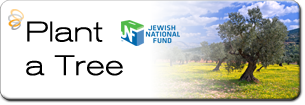Honor and Commemorate Loved Ones by Planting a Tree in Israel
Planting a tree in Israel in memory of a loved one is a time-honored tradition that is symbolic and heartfelt. During all life-cycle events, but in particular when someone has experienced a loss during a shiva and throughout the mourning process, planting a tree is a very common and appropriate way to show your support.
In the Jewish faith, there are many ways to celebrate, honor and commemorate the life of loved ones to help carry on traditions, customs and rituals. In Judaism, it is important to perpetuate the life and legacy of friends, family and ancestors no longer here for future generations.
Jewish National Fund ("JNF") has partnered with shiva.com to continue the legacy of planting trees in Israel. Planting a tree in Israel is the perfect way to show you care. You can plant trees 'in memory' of your loved one and help green the land of Israel. For each order, a certificate is mailed to the recipient with your personal message. Shiva.com focuses exclusively on providing culturally-appropriate ways to express condolences during shiva and periods of Jewish mourning and is dedicated to helping honor and commemorate loved ones.
The Tree Certificate & Acknowledgement Card
With each order to Plant Trees in Israel, a beautiful certificate is mailed to the recipient with a personalized message. The certificate contains an illustration of a landscape with tree groves, together with a traditional and culturally-appropriate prayer.

Gifts of "Chai" ("$18") In Judaism
It is common to give and receive gifts in multiples of $18 or "Chai", which in part signifies a good omen for life. In fact, the longstanding Jewish tradition of gifting, contributing or donating in increments of $18 to individuals is often considered a good deed, or "mitzvah".
Read More >>
Why Plant Trees in Israel?
There are several reasons that individuals and organizations observe the longstanding tradition of planting trees in Israel.
Life-Cycle Events: Within Judaism, the celebration, honoring and commemorating of individuals during various rituals, rights of passage and stages of life, including births, marriage and deaths have been symbolically marked by the planting of trees. The significance draws upon the roots of a tree, connection to Israel and even the expansion of tree branches.
Spiritual, Cultural and Religious: There are a numerous interpretations that place religious and spiritual significance on the tree and connect to Israel. In many respects the life cycle of a tree mirrors closely to that of the human life cycle and bridging the the planting of a tree helps to connect and in some ways is representative to life itself. Conceptually, the seeds of trees spread wide and far like humans do, across the entire world. In a Biblical context, the Tree of Knowledge was one of the first things shown to Adam, thus demonstrating the importance of a connection between man and trees. In Judaism, Tu B'Shevat is a Jewish holiday celebrated annually honoring the birth of the trees and the fruit that they deliver to help sustain humankind.
Greening of the Earth: The land of Israel is located in the Middle East, which is a dry and desert region possessing limited trees and no natural forests. Therefore, all forests are hand-planted and require humanity to ensure that the land is fertile and habitable. Through dedication and devotion to greening in less than 60 years Israel has become one of only two countries in the world that entered the 21st century with a net gain in its number of trees.
Environmentally Friendly and Preservation: There are many known environmental advantages to planting trees. Most notably, trees reduce carbon emissions, clean the air, conserve water, provide habitat, all of which help to protect against climate change.
History of Planting Trees in Israel
Over the past 113 years it has been a primary focus to plant trees in Israel to help green the lands. One Jewish National Fund's founding principles is to preserve and green the land of Israel. During this time, JNF has lead the way, planting over 250 million trees, creating and building over 240 reservoirs and dams, developing over 250,000 acres of land, and establishing more than 2,000 parks.
Results of Planting Trees
Since the tree planting effort began, hundreds of picnic areas, forests, and parklands have been created helping to expand the greening of the land beyond Jerusalem. This has created vast areas with vibrant parklands in more isolated and desolate ares including Yatir in the southern Hebron Hills, the Eshkol region in the cleft of the southern hills and others in the Negev, on the edge of the desert. Most notably the capital of the Negev, Be'er Sheva, a known desert area, was heavily planted to create a forest consisting of over 45,000 acres of land.
